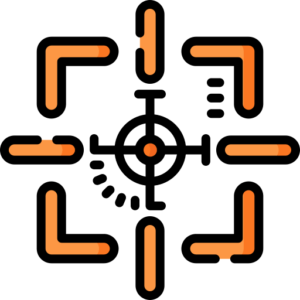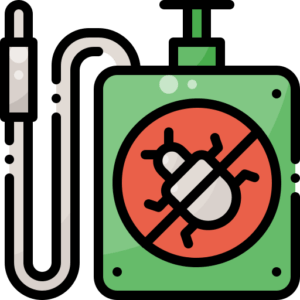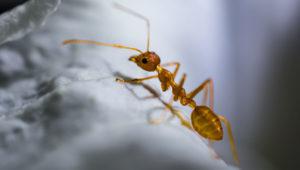Small pharaoh ant - a source of big problems in the house
Sometimes in living quarters you can see red ants. These are pharaoh ants. Usually they live in the kitchen, getting their own food. However, these small insects are harmful to humans.
Content
What pharaoh ants look like: photo
Description of the pharaoh ant
Name: Pharaoh ant, brownie or ship
Latin: Monomorium pharaonisClass: Insects - Insecta
Squad: Hymenoptera - Hymenoptera
Family: Ants - Formicidae
 | Habitats: | tropics and temperate climate |
 | Dangerous for: | small insects, eat fruits |
 | Means of destruction: | folk remedies, traps |
The insect is very small. The size varies between 2-2,5 mm. The color changes from light yellow to reddish brown. There are red and black spots on the belly. They are also called red, house or ship ants. Workers have a sting that is used solely to communicate with each other using pheromones. The males have wings. They are almost black in color.
Life cycle of pharaoh ants
One colony can contain more than 300000 individuals. A developed family consists of 100 mature females. During the year, the number of individuals in each family increases to three thousand individuals.
1/10 of the entire family is made up of worker ants. They get food. The rest of the family serves the offspring. The period of formation from the egg stage to the worker ant takes 38 days, and in mature individuals, 42 days.
The founding queen establishes a colony. Male and female individuals do not fly. After mating is over, the worker ants gnaw off the wings of the females. Further, the uterus can be in its own family or found a new one. Females tend to create an isolated nest chamber in a secluded warm place. This is where the eggs are laid.
When the first working individuals appear, the queen stops taking care of the offspring and is only engaged in laying eggs. Thanks to pheromones, the uterus controls the exit of young females. A family is formed and some larvae become young winged ants.
The life expectancy of females is about 10 months, and males - up to 20 days. Working individuals live 2 months. Ants don't hibernate. They swarm all year round.
Pharaoh Ant Habitat
This species prefers the tropics. The homeland of the insect is India. However, on ships they got to all countries of the world. Insects cannot withstand low temperatures.
They can live in temperate climates if there is central heating. Indoors, dark, warm, damp places suit them. They can live in the walls of houses, cracks in the floor, boxes, vases, appliances, under wallpaper.
Diet of pharaoh ants
Ants are omnivores. Any product left by a person is suitable for them. Insects need carbohydrates.
They prefer sugar and syrups.
Harm from pharaoh ants
Ant infestation in a home can be a big problem. Insects can harm people:
- transfer bacteria, infections to various foods;
- damage the wiring, causing a short circuit;
- disable the equipment inside which nests are built;
- cause psychological discomfort.
Causes of pharaoh ants
Pharaoh ants climb into a human dwelling in search of food and shelter. They will never go away on their own. The main reasons include:
- constant temperature regime from 15 to 20 degrees of heat;
- the presence of cracks in the walls and baseboards;
- available source of water;
- indoor flowers;
- first floor of the house;
- processing in the adjacent room;
- free access to sweets and food.
How to get rid of ants in the house
There are several ways to get rid of annoying insects indoors. It is better to apply them in a complex:
- Clean the house regularly, take out the trash, put things in order.
- Apply traditional, safe methods.
- Set up a series of traps to reduce the numbers.
- Use chemicals if necessary.
Conclusion
The appearance of small red ants in a residential area upsets the residents. Living in the kitchen, they can be detrimental to health. In case of detection with pests, it is necessary to deal with chemicals or call exterminators.
Previous